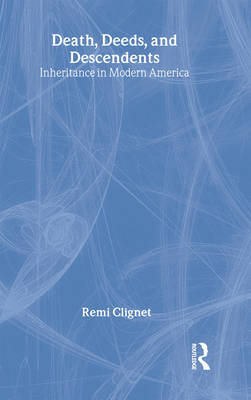
- Afhalen na 1 uur in een winkel met voorraad
- Gratis thuislevering in België vanaf € 30
- Ruim aanbod met 7 miljoen producten
- Afhalen na 1 uur in een winkel met voorraad
- Gratis thuislevering in België vanaf € 30
- Ruim aanbod met 7 miljoen producten
Zoeken
Death, Deeds, and Descendents
Inheritance in Modern America
Remi Clignet, Jens Beckert, Brooke Harrington
€ 259,45
+ 518 punten
Uitvoering
Omschrijving
Clignet's analysis of inheritance patterns in modern America is the first sustained treatment of the subject by a sociologist. Clignet shows that even today inheritance serves to perpetuate both familial wealth and familial relations. He examines what leads decedents to chose particular legal instruments (wills, trusts, insurance policies, gifts inter vivos) and how, in turn, the instrument chosen helps explain the extent and the form of inequalities in bequests, of a result of the gender or matrimonial status of the beneficiaries. The author's major is to identify and explain the most significant sources of variations in the amount and the direction of transfers of wealth after death in the United States. He uses two kinds of primary data: estate tax returns filed by a sample of male and female beneficiaries to estates in 1920 and 1944, representing two successive generations of estate transfers, and publicly recorded legal instruments such as wills and trusts. In addition, Clignet draws widely on secondary sources in the fields of anthropology, economics, and history. His findings reflect substantive and methodological concerns. The analysis underlines the need to rethink the sociology of generational bonds, as it is informed by age and gender. Death, Deeds, and Descendants underscores the variety of forms of inequality that bequests take and highlights the complexity of interrelations between the cultures of the decedents' nationalities and issues like occupation and gender. Inheritance is viewed as a way of illuminating the subtle tensions between continuity and change in American society. This book is an important contribution to the study of the relationship between sociology of the family and sociology of social stratification.
Specificaties
Betrokkenen
- Auteur(s):
- Uitgeverij:
Inhoud
- Aantal bladzijden:
- 236
- Taal:
- Engels
- Reeks:
Eigenschappen
- Productcode (EAN):
- 9780202303987
- Verschijningsdatum:
- 31/12/1992
- Uitvoering:
- Hardcover
- Formaat:
- Genaaid
- Afmetingen:
- 159 mm x 237 mm
- Gewicht:
- 562 g

Alleen bij Standaard Boekhandel
+ 518 punten op je klantenkaart van Standaard Boekhandel
Beoordelingen
We publiceren alleen reviews die voldoen aan de voorwaarden voor reviews. Bekijk onze voorwaarden voor reviews.











